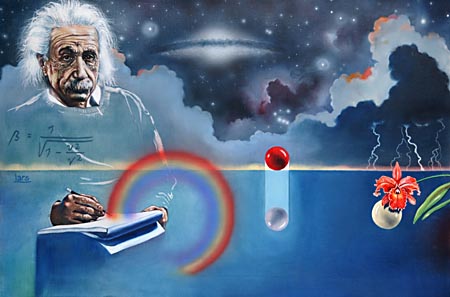There is a basic principle, of which these three sentences from the website,
Digital Bits Skeptic, is but another instance. Scientists, in particular, and self-styled atheists/agnostics, in general, make lousy theologians (see the last paragraph of my RPK posting, "
Reverse God-of-the-Gaps"). By inserting the simple little word, "always," into these three sentences the author has transformed them into theological cum moral statements of faith and ethics. They are certainly not scientific since such absolutes are not testable. Run as many experiments as you will, there is
always the possibility of a fluke, no matter how remote. And it takes only one fluke to prove an absolute wrong.
So, treating these sentences as theology, there is much to criticize. There are, for starters, the issues of defining the moral category of "better" as well as the meaning of the concept of rationality. The Wiktionary definition of "
rational" is "healthy or balanced intellectually, reasonable" and "capable of deductive reasoning." That is an impressively broad definition. Things that are entirely rational in one society, say in Chiang Mai, Thailand, are certainly not rational in another, say Lowville, NY. Dr. Francis S. Collins' book,
The Language of God, whatever else it might be, fits the Wiktionary definition in its reasonable and balanced presentation of its case in spite of the fact that Collins is a believer as well as a scientist. That is to say, it is not immediately apparent that the the two categories of rational and religious are even mutually exclusive by the definition of rationality. The theological works of a Barth or a Tillich can hardly be labeled "irrational" by any reasonable definition of rationality. Dealing with the category of "better" is also tricky.
How is rationality better? What does "better" mean and how do you determine objective (i.e. scientific) measures for better in this case? Indeed, one might ask if it is reasonable (rational) to claim that rationality is
always "better" than religion?
The truth of the matter is that our anonymous author's first sentence is but short hand for, "
My rationality, which
I believe is based on science, is always better by
my standards and in
my opinion than is
your religion, which
I believe to be always irrational by definition." In other words, the sentence expresses subjective personal beliefs, opinions, and prejudices disguised as an objective statement of fact; and it expresses them normatively, which makes it a moral statement as well. In fact, the statement is not even theological. It is ideology, pure and simple.
We might (reasonably) ask also if it is true that provable ideas are
always preferable to beliefs—and what that claim even means. What is perhaps most striking in this second sentence is the way it devalues "belief" when scientists themselves are utterly dependent on their faith in their own senses to understand reality. There is no way to prove that our senses give us a true picture of reality, an issue that philosophy has wrestled with long and hard. We trust our senses as a matter of faith and belief. In the same way, scientists trust their method as providing them with a reliable description of reality. Science itself is a belief system, which renders the second sentence nonsensical from the get-go. The whole statement, in fact, is a statement of faith expressing the beliefs of the author.
The category of "provable idea" is also problematic as is the implied assumption that religion is founded on nothing more than beliefs, so-called. What constitutes "proof" is a difficult issue. At what point did science
prove the idea of evolution? While generally accepted as proven today, it took decades to achieve that status, and there was no one point at which biologists said, "OK,
now it is proven." What exactly, then, constitutes the level of certainty necessary to render an idea proven?
One might respond that a "provable idea" is any proposition that can one day be proven true by the application of the scientific method. By this measure, the idea that there is a God that created the universe is provable. At least, scientists writing against religion from time to time acknowledge that science might conceivably find someday that God is the creator of the universe. They avow that it is highly unlikely to happen, but conceivable. God is thus a "provable idea." Or again, there is a growing body of data demonstrating a positive correlation between the practice of religion and well-being. Actively religious people are happier and apparently healthier than those who do not actively engage in religious activities. Which is to say that the often-expressed
belief of religious people that a life of faith is observably better than a life lived without faith is a provable idea. Religious beliefs thus can be treated as provable ideas rendering the distinction between provable ideas and beliefs fuzzy and permeable. There is some evidence, furthermore, to indicate that the placebo effect is a real one: if a person
believes he is going to get better she actually does get better. Belief, sometimes in and of itself, can be a good idea and preferable to the facts provided by science.
The point is that the three sentences above constitute a personal faith-like statement of ideology, one based on assumptions that themselves suggest more of an ideological rather than a scientific mindset. Why is it that a certain class of scientist types don't seem to be able to bring a scientific concern for precision, clarity, and humility (i.e. saying only as much as the actual data allows one to say) to bear on religious subjects? Where is the patient neutrality of the scientist "on the hunt" for truth? Evidently this class of scientist believes itself at war with a certain class of religionists and perhaps is trying to fight fire with fire. There must be a better way.
 Under the posting title, "These Are Sad Times," this past Tuesday I shared with readers the comment made by Rep. Todd Akin (R - MO) that liberals at heart are God-haters who want to replace God with big government. He made the comment last Friday. Monday, he refused to apologize for it, but then on Tuesday he made one of those non-apology apologies that essentially means he still believes liberalism breeds God-hating (source).
Under the posting title, "These Are Sad Times," this past Tuesday I shared with readers the comment made by Rep. Todd Akin (R - MO) that liberals at heart are God-haters who want to replace God with big government. He made the comment last Friday. Monday, he refused to apologize for it, but then on Tuesday he made one of those non-apology apologies that essentially means he still believes liberalism breeds God-hating (source).




























